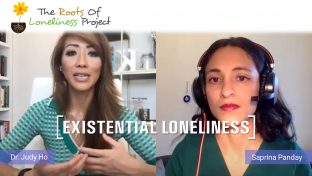Loneliness At Midlife Is A Challenge, But One You Can Take On

Middle age is a time when many life changes may be taking place related to family dynamics, health, employment, and even living situations — and it can leave you feeling isolated and alone.
- 30% of middle-aged people in the United States will experience loneliness and it can stem from regrets, signs of aging, lack of direction, empty nest syndrome, or feeling like they should have accomplished more “by now.”
- Some also experience a dramatic role reversal and find themselves in a position where they need to become the caregivers, helping their parents as they age.
- Although we can’t change our past and our lives are “half over,” which is a sobering existential thought to consider, it’s important to remember that there is so much living left to do.
Struggling with loneliness or having a mental health crisis?
- Suicide Prevention Lifeline: 1-800-273-TALK (8255); Deaf or hard of hearing dial 711 before the number or connect via online chat
I’m middle-aged and can’t sleep, thanks to an anxiety cocktail mixed with perimenopause and a splash of regret.
I pick up my phone and scroll through Instagram. Big mistake. It’s only made me feel worse.
Being in my 40s and in what folks consider to be “midlife,” negative thoughts about my life’s direction — and worth, and meaning — are a constant companion.
I think about all of the many possibilities that I have declined over the years for one reason or another, and the sense of who I am now becomes diminished.
“This is it. This is as good as it gets.”
I’ve felt disappointment and anxiety from unfulfilling work, had too many bad relationships, and am more than a little aware of the physical signs of aging — in myself and those in my family.
I often think “what’s done is done,” and although I can’t change history (or my decisions), it makes me feel very isolated and lonely — as if I’m the only person in the world who experiences these feelings.
After talking to friends my age, I’m definitely not the only one who feels this way. But still…
Why Do People Experience Loneliness In Midlife?

Transitions can be difficult.
Generally considered to fall between the ages of 40 and 60, midlife is the transition period between being a young adult and becoming an older person.
It’s a time when most people are experiencing a lot of life changes — or want to.
For me, there is a conflict between my perception of myself and my life as I think it is — and what I want it to be.
I put a lot of pressure on myself because I feel like I should have accomplished more personally and professionally by this point in my life — and the clock is ticking.
No one lives forever.
Our time is finite, and that’s a deeply sobering and existential thought when you’re in your 40s — the average life expectancy in the United States is only 77.
Especially with social media, I find it so easy to compare myself to other people who seem to have it all figured out, even though I know that what they’re sharing online is just the highlight reel — and not their full reality.
Looking back on my life, I have lots of great memories but I am not without regret.
Still, I don’t want to live with regrets. I want to respect my past decisions knowing that I did the best I could.
A friend I grew up with has three kids that have left for college. She’s always been a mom. She says she feels lost and doesn’t know who she is anymore — or what she wants to do with her life.
She wants to go back to work but doesn’t have any of the skills needed in today’s workforce.
She finally went on an interview, only to discover that the person who would be her boss could also be her daughter! She came away from that interview feeling lonely and depressed.
On the flip side of her experience, many women find themselves working harder than ever in middle-age because they’re no longer restricted by childcare duties or having a young family to care for.
Some may have focused on their careers so much that kids are now in the rearview window — what was once a possibility in their younger years may become a regret in midlife.
This can cause feelings of isolation and loneliness, leading to serious health conditions.
Loneliness is the most common cause of depression in older adults, so it’s easy to see the correlation between middle-aged loneliness and depression.
Middle-age loneliness may arise from:
- Feeling unfulfilled in life
- Feeling lost in life or unsure of what to do with it
- Experiencing the physical signs of aging
- Having intense feelings of nostalgia
- Experiencing feelings of boredom, emptiness, and meaninglessness
- Comparing oneself to others who seem happier or more fulfilled
- Changes in social interactions
- Fluctuations in income
- Dealing with intense feelings of regret over career or relationship decisions
- The development of health issues
- Watching your parents age
- Being “done” raising children as they leave home
The dramatic life changes that middle-aged people experience can negatively affect their sense of self-worth.
In particular, empty nest syndrome is something that comes up for many people in midlife.
It can be difficult for a mother or father to accept that their role in their children’s lives has majorly diminished.
And they might also experience a dramatic role reversal when it comes to the relationship they have with their own parents if they’re experiencing a decline in health.
Once dependants themselves, middle-aged folks often find themselves in a position where they need to become the caregivers, helping their parents as they age.
This transition can be upsetting — serving as yet another reminder that we’re all here for only a limited time — and caring for elderly relatives can be a difficult and time-consuming undertaking.
Additionally, many people in midlife find themselves taking care of their aging parents, which can be a challenging and upsetting transition.
How To Ease The Loneliness Of Midlife And Reclaim Your Happiness

To avoid getting sucked into a black hole of midlife loneliness and misery, I have developed some habits to help myself whenever my mind starts going to dark places.
I cannot change the past. The present is now, and the future is still out there — waiting for me.
It waits for all of us.
1. Get off of social media and focus on yourself:
You don’t have to delete your social media accounts but you should limit the time you currently spend scrolling through other people’s lives.
They’re not showing you the truth — at least, not the whole truth.
Barring those few rare gems who provide an unfiltered view of their lives on social media, just about everyone sticks to sharing only their best moments with the world.
Not to mention that there are filters and crafty lighting tricks to remove wrinkles from every photography angle.
That person who’s positively glowing and looks like they haven’t aged a day since high school? They have wrinkles just like you and me — only we don’t walk around with gauzy filters over our faces to hide our imperfections.
The photographs on social media are a single — and often heavily-edited-for-your-pleasure — moment in time.
You can’t compare yourself to that — and you shouldn’t. It’s terrible for your mental health.
2. Volunteer your time helping others — and help yourself:
Perspective can do wonders for your state of mind and nothing puts things in perspective faster than helping those in need.
I’ve found that when I help people who are less fortunate than myself, it takes my mind off of my own troubles but it also helps me to put something good into the world.
By volunteering, every regret I might have had over what I didn’t do in the past is replaced with something positive and useful that I am doing right now.
Yesterday is gone, but today is still here.
Volunteering has shown me that as long as we’re alive, there is always time to make a change and there is always time to bring some good into the world — even if it’s through “small” actions.
Every single act of volunteerism will help someone, somewhere.
3. Exercise with your health and happiness in mind:
None of us are getting any younger, but that’s also why it’s so important to make sure we’re taking care of our bodies — and that means getting exercise that boosts our health and happiness.
You don’t have to become The Hulk (unless that’s your goal) but physical activity sets off endorphins which will help to improve your mood, especially if you’re ruminating on the past or are worried about your future.
Go for a walk, take a pilates class, or lift weights. Learn how to belly dance or start preparing to take part in a 5K race for charity.
Choose whatever type of exercise and movement sounds most enjoyable — it doesn’t matter what it is.
The point is to get your ass moving. You will physically feel so much better.
4. Meet up with a friend — and schedule it as an ongoing date:
In midlife, our days and weeks tend to run from one to the next — work, home, sleep. Lather, rinse, repeat. We don’t always make the time to get together with our friends and with busy schedules, we have to.
A lack of social interaction can lead to loneliness and as the weeks and months pass without getting together with our friends, we’re missing out on valuable time with those who mean the most to us.
Allow me to remind you, once again, that we’re only here for a limited time.
Text a friend that you always have fun with. Get coffee or a drink and air out your feelings — and let them do the same.
I guarantee they have something they need to talk about, as well, and you won’t feel so alone in your own midlife struggles.
5. Let your feelings out — and the memories in:
Bottling up the way we feel can be a nice way to “keep the peace” in our daily lives but it can be a terrible thing for our mental and emotional health, especially when we’re in midlife and struggling.
Creative outlets like writing, painting, playing music, or other leisurely pursuits are a great way to release your anxiety, fears, regrets, worries, or even anger.
But sometimes, they can also help us recall our best-loved memories, too.
Since I write for work, I’m not a big journal person but you might try writing down one of your favorite memories — and why you treasure it. As you write, share exactly what you love about it so much.
Now close your eyes and picture everything you remember about the scene, down to the finest details, and let yourself spend a little time in that happy space.
This will help with your perspective as it relates to where you are in your life right now, but it will also help you remember that while you have had great times in the past, there’s room for more of them in the future.
Was it a particular vacation you loved? Make a plan to take that trip again — because there is still time for new memories to be made.
6. Explore the great unknown:
You don’t have to travel the world to explore it — in fact, that idea will only make you feel down about yourself if you don’t have the means to do so — but DO take advantage of where you live.
There are so many different groups that have involvement with specific interests in just about every city or town — even the smallest ones. They’ll offer plenty of opportunities to explore something you haven’t before.
Even if it’s practically in your backyard.
Meet up with a science museum group, attend a local historical society meeting, or take a wine-tasting tour at a local winery.
You will be around other people and have new experiences you wouldn’t have had otherwise, which can bring a spark of the unexpected to your life.
Without traveling more than a handful of miles, you can go on a refreshing journey that will break the monotony of midlife, giving you something to look forward to while introducing you to new people that might just become a part of your permanent social circle.
Closing Thoughts
Everyone experiences loneliness at some point in their lives. Middle age is a time when many life changes may be taking place and it can leave you feeling isolated and alone.
Remember that other people your age are probably having very similar thoughts and experiences — it isn’t just you.
So go easy on yourself.
I’ll let you in on a little secret: We’re all struggling, in some way or another. But we’re all doing our best, and you are, too.
Although we can’t change our past and our lives are “half over,” there is so much living left to do.
The time of your life isn’t then, it’s right now.
It’s always right now.
Editor’s Note: This article is part of The Roots Of Loneliness Project, the first-of-its-kind resource that comprehensively explores the phenomenon of loneliness and over 100 types we might experience during our lives.
Find Help Now
If you’re struggling with midlife loneliness, we’ve put together resources to meet you wherever you are — whether you want someone to talk to right now, or are looking for longer-term ways to help ease your loneliness.
- Suicide Prevention Lifeline: 1-800-273-TALK (8255); Deaf or hard of hearing dial 711 before the number or connect via online chat
- Resources & Emotional Support For Loneliness
- Volunteer & Pet Adoption Opportunities






